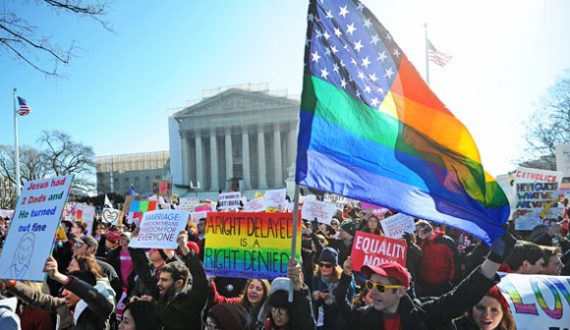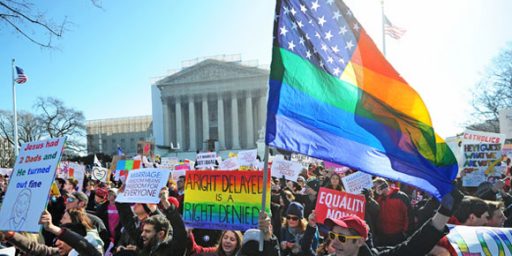Latest Round Of Same-Sex Marriage Appeals Arrive At Supreme Court
The process that seems likely to lead to a Supreme Court ruling on same-sex marriage has begun.
As expected, the Plaintiffs involved in the same-sex marriage cases in the Sixth Circuit Court of Appeals, which ruled just under two weeks ago in favor of the state laws banning same-sex marriage, have begun filing their requests to the Supreme Court to accept their cases
WASHINGTON — Gay and lesbian couples filed petitions on Friday asking the Supreme Court to decide whether there is a constitutional right to same-sex marriage. The petitions arrived eight days after the United States Court of Appeals for the Sixth Circuit, in Cincinnati, upheld bans on same-sex marriage in Kentucky, Michigan, Ohio and Tennessee.
The fast pace of the filings was an effort to ensure that the justices be able to hear and decide a case before the current Supreme Court term ends in late June.
On Oct. 6, the Supreme Court surprised most observers by turning down petitions seeking to appeal rulings striking down same-sex marriage bans in Indiana, Oklahoma, Utah, Virginia and Wisconsin. When the Supreme Court acted, there was as yet no disagreement among the federal appeals courts, a criterion the justices often consider in deciding whether to agree to hear a case.
The Sixth Circuit’s decision changed that, and a Supreme Court review is now likely.
The effect of the Supreme Court’s move last month, coupled with a decision the next day from the Ninth Circuit, in San Francisco, was to set the groundwork for same-sex marriage in 35 states and the District of Columbia.
An order issued Thursday in an immigration case hinted that the court had been divided about how to proceed last month. JusticeClarence Thomas, joined by Justice Antonin Scalia, said the court ought to step in whenever a lower federal court strikes down a provision of a state law “even in the absence of disagreement among the lower courts.”
“But for reasons that escape me,” Justice Thomas wrote, “we have not done so with any consistency, especially in recent months.” He cited several same-sex marriage cases.
In September, Justice Ruth Bader Ginsburg said the Supreme Court’s reluctance to intercede could change depending on how the Sixth Circuit ruled.
“Now if that court should disagree with the others,” she said, “then there will be some urgency in the court taking the case.”
The Sixth Circuit’s decision concerned two kinds of issues. Couples from Kentucky and Michigan challenged state amendments barring same-sex marriage. Couples from Ohio and Tennessee asked the lower courts to require their states to recognize same-sex marriages performed legally in other states.
Lyle Denniston has further details:
The Sixth Circuit’s decision upheld bans on same-sex marriages in Kentucky and Michigan and on recognition of same-sex marriages in Ohio and Tennessee. While the majority in that court rejected all of the arguments made by challengers to those bans, the core of the decision was the declaration that the issue of same-sex marriage should be left to the voters and legislatures of the states. It found that view reinforced by a one-sentence Supreme Court decision in 1972, Baker v. Nelson,which indicated that the controversy did not raise “a substantial federal question.”
The appeals court said it was bound by that precedent. The Supreme Court, however, would be free to find that precedent no longer controlling, if it were inclined to move beyond it and confront the issue anew.
Although the challengers to the bans in the four states that make up the Sixth Circuit could have taken as long as ninety days to file petitions for review with the Supreme Court, their lawyers began filing after just eight days had passed, aiming to get the issue before the Court for decision during the current Term. There have been indications in recent days that Court aides had encouraged the attorneys to file promptly, especially because they had indicated they did not plan to ask the Sixth Circuit to reconsider the ruling en banc.
If the petitions and responses are ready for the Justices to consider by their private Conference on January 9, the cases could be heard and decided before the current Term ends, probably in late June. If the states involved join in urging Supreme Court review, or do not resist that, the cases could be ready for the Justices’ first look earlier than that.
The Court has not acted on any petition for review of a federal appeals court decision since it issued orders on October 6 declining to consider petitions involving the bans in five states. At that time, however, there was no division among the federal appeals courts on the issue. That changed with the Sixth Circuit’s decision on November 6, in the case titled DeBoer v. Snyder — a title taken from a Michigan case.
In the newly filed Ohio case on the plea to require states to recognize existing same-sex marriages, the challengers cited five “critical errors of law” in the Sixth Circuit’s decision, “heightening the need for intervention by” the Supreme Court.
Here, in summary, are the claimed errors that the petition recited:
First, the Supreme Court’s summary ruling in 1972 in Baker v. Nelson barred review of new challenges to state bans on same-sex marriage.
Second, the fundamental right to marry that the Supreme Court has long recognized as guaranteed by the Constitution does not include same-sex couples.
Third, a state ban on same-sex marriage is to be judged only by the least demanding constitutional standard, ”rational basis” review.
Fourth, a ban on same-sex marriage can be justified by a state policy of encouraging child-rearing by channeling opposite-sex couples, who can have children by natural means, into marriage to promote solid family formation.
Fifth, the issue of the rights and protections of same-sex couples should be left to the political processes, especially to the voters of the states acting in referendum elections.
On each of those points, the Ohio petition contended, the federal appeals courts are divided.
Under the Rules of the U.S. Supreme Court, any response to the Petitions for A Writ Of Certiorari must be filed within 30 days after the case is docketed, meaning that responses in these two cases would be due by mid-December, and responses in the remaining cases covering Kentucky and Michigan would be due 30 days after those cases are docketed with the Court, which could be as early as today depending on when the Petitions in those cases are filed. The winning party on appeal is not required by the rules to file a response to a petition, but it’s generally the case that some kind of response is filed. In the previous same-sex marriage cases that were before the Court, both the parties challenging the bans and the states or other entities defending the laws in question, were in agreement that the Court should accept the cases for appeal. That did not happen, of course, but this time around the situation is significantly different given that we have four Circuits — the 4th, 7th, 9th and 10th — that have ruled that bans on same-sex marriage are banned by the 14th Amendment to the Constitution while the Sixth Circuit has ruled that they are not. As I’ve noted before, this Circuit split should be enough reason alone for the Supreme Court to accept the cases for appeal. As Denniston notes, there is currently more than enough time for that to happen so that the case could be scheduled for briefing beginning at the start of 2015 and oral argument scheduled at the end of March or, possibly more likely, during the Court’s final session of oral argument in April. In either case, if that happens, then we could expect a decision on this issue by the end of June when the Court’s current term ends, although there is always the rather remote possibility that the Court could delay consideration of these cases until its October 2015 term.
Whatever happens, though, the legal battle over same-sex marriage in the United States seems as though it is entering its final stages.
You can read the petition in Henry et al v. Hodges et al, the case challenging Ohio’s law here, and the petition in Tanco et al v. Haslam et al, the case challenging Tennessee’s law here.
Update: Two more petitions have been filed this afternoon from the Sixth Circuit cases, one in Love et al v. Beshear et al, challenging the marriage ban in Kentucky, and the other in DeBoer et al v. Snyder et al challenging Michigan’s ban. This means the appeals from the Plaintiffs in all four states in the Sixth Circuit are now before the Supreme Court.






And another case of people using religion to justify their hatred of others.
http://talkingpointsmemo.com/livewire/arizona-wedding-planner-refuses-gay-couple
@C. Clavin:
Yea I just saw that report myself.
It seems pretty clear that the anti constituency has accepted the glaring likelihood that they are going to lose on the SSM issue at SCOTUS, and are planning for that event by choosing to pursue the “yes, it’s the law, but it doesn’t apply to us because RFRA & religion, blah blah blah.”
They intend to pursue an end run around the eventual ruling from SCOTUS by asserting a religious exemption, which will lead us into round 2 of this fight.
@Harvaw92:
The RFRA issue is a real one, as Hobby Lobby demonstrated, and I’ve kind of changed my mind about the advisability of such laws. I was among those who objected to the outcome of the court’s decision in Employment Division v. Smith, but the deeper we get into the weeds on how RFRA’s are applied at the state and Federal level the more skeptical I’ve become about the wisdom of such laws.
@Doug Mataconis:
RFRA is a de facto get out of jail free card, and that was always going to be the case. The people pushing this RFRA nonsense are doing so in the bubble world belief that it applies to THEIR religious beliefs, because those are “right”, but it doesn’t apply to those other “wrong” believing people.
The reality is that there is no constitutionally permissible way – unless we’ve just decided to make the list of suspect classes several pages long anyway – to say that a law like RFRA only applies to the things that we like, or with which the majority is morally comfortable. It will have to apply across the board in protecting just about anything that some nimrod with the imagination to dream up a religious excuse decides he/she doesn’t want to do. For that matter, it extends protection to a subset of citizens (those who have religious beliefs) which are patently unavailable to citizens who do not have religious beliefs.